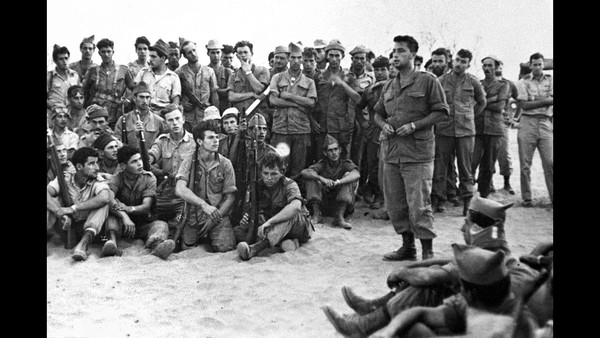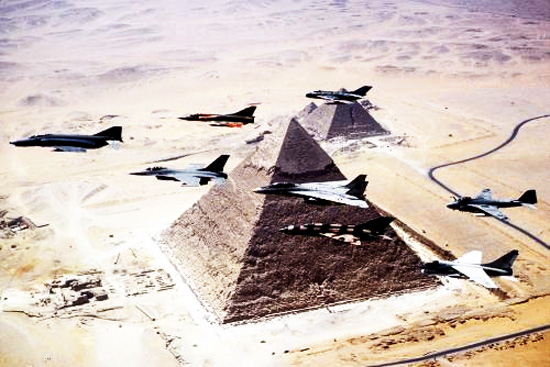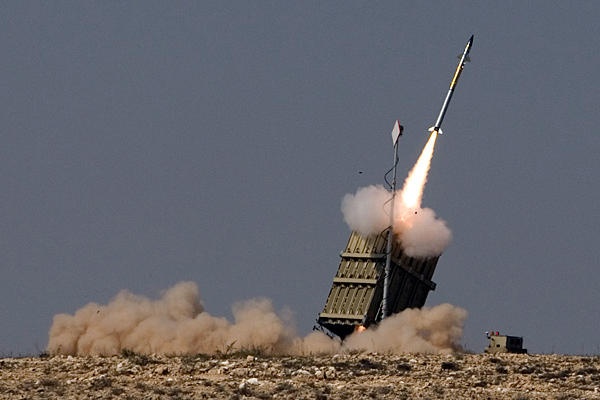
I’ve always believed that it is right and honorable to consciously pause and reflect whenever a person of true world-historical stature passes from the stage. There is much to be said for taking the proverbial moment of silence. It grounds us. We recall – however so briefly – our fleeting place in the universe – the good and the bad – and the ways in which even a single individual can alter the course of history.
Importantly, remembrance is not merely making a connection to the departed or dead - It is about active engagement with those who have played a profound role in shaping where we have gone as a world, defining who we’ve become as human beings and frequently, by offering examples from which one can continue to learn long into the future. There is indeed good reason why active remembrance (everything from funerals and memorials in the West to various forms of ancestor worship in the East) has always been central to nearly every religious tradition.
This past weekend’s death of controversial former Israeli leader, Ariel Sharon, constitutes precisely such an historically appropriate time for memorial and reflection. If Mr. Sharon can be said to have had any consistent trait – as Prime Minister or as a military leader – it was his unmatched ability to constantly surprise not only his enemies but closest allies as well. Whatever you may think of him personally - or of Israel or of US/Israel politics – taking the time to consider his legacy matters. And committing the error of viewing this man’s biography either as too controversial to embrace or – very differently – too influential to criticize – would both be huge mistakes. Remembrance requires neither criticism nor praise.
So first a bit of history – and then my own thoughts for whatever little value they may be worth.
Here’s the thing: Sharon’s story isn’t merely a saga about the Arab-Israeli conflict. It is – to borrow the already WAY over-used (yet, in this instance, oddly appropriate) words of New York City’s new mayor – “a tale of two cities” – A story about the righteous defense of the Jewish homeland and simultaneously about the immense moral conflicts that have always defined that identical struggle. It is also a sort of “analogue story” of anyone (even boring bankers like me) who more often than not find themselves pulled apart by opposing ethical, political and moral magnets – pained by conflicting truths - but who, admittedly, have never faced anything close to the chaotic existence in which Mr. Sharon lived out his formative years. How I might have emerged from that type of turmoil and uncertainty is a ludicrously difficult if not impossible question to answer. I have none to offer. Where I think we can learn the most from someone like Sharon is that the truly influential among us are so often life-long “survivors.”
Put slightly differently, unless you spent your time at age 13 organizing makeshift artillery defenses against waves of people fully determined to murder you, murder your closest friends and murder your family – all for “reasons” that must have seemed largely incomprehensible at that age, all I ask is this: Perhaps think twice before you begin to judge . . .
Mr. Sharon commenced his rapid ascent through the ranks of the Israeli military well before the 1948 War of independence. He first started to volunteer for dangerous missions with Gadna, a paramilitary high school organization, and then with Haganah, the main underground Zionist fighting brigade, which eventually evolved into the Israel Defense Forces. Sharon next went on to found Israel’s first special forces division known as Unit 101 [great detailed article can be found at the Princeton University history website, here] which developed a reputation for extreme effectiveness and unrelenting brutality, usually in equal measure.

As was noted in Mr. Sharon’s New York Times obituary: “Unit 101 cultivated a sense among its members of being above rules and able to operate under the most severe conditions, an attitude that later permeated all elite Israeli military units.” Mr. Sharon’s unique style and fervent belief that no cause could be higher than defeating the enemies of Israel, resulted both in excessive use of force (at least according to critics) but also legendary victories such as his brilliantly successful secret crossing of the Suez Canal to fight the Egyption Army behind their own lines during the 1973 Yom Kippur War - now viewed as that conflict’s decisive turning point – as well as numerous intelligence raids deep within Gaza that proved highly effective in suppressing Palestinian terrorism. Today, Sharon’s daring Suez operation has become standard teaching at military academies around the globe.

On the other hand, Mr. Sharon’s reputation has also been tarred with responsibility for the massacres carried out by Christian militias during the Lebanon War in 1982 (condemned even by the United States and by Ronald Reagan, specificially) There were events like the battle of “Qibya” in which 69 civilians were allegedly killed by Unit 101 – nearly half women and children. He spearheaded one of Israel’s most aggressive (and internationally condemned) moments by stirring up massive Palestinian resentment in a defiant march to  Jerusalem’s sacred Temple Mount in 2000 (the beginning of the second Palestinian Intifada) – yet incongruently, over the course of his long career (and this speaks so directly to the man’s paradoxical nature) was almost thrown out of the IDF itself on multiple occasions for directly disobeying orders. Notably, Sharon was also severely wounded in battle during at least three separate actions but, until deciding to become a full-time politician beginning in the 1980s, he nearly always managed to rebuild both his physical stamina and his immense stature within the armed forces.

Later, as Prime Minister, Mr. Sharon literally shocked the world in an act that can legitimately be compared with President Nixon’s trip to China and President Reagan’s decision to enter into one-on-one negotiations with the Soviet Union: He ordered all Israeli settlers and soldiers removed from the Gaza strip in August of 2005. Sharon argued that this move was 100% consistent with his core philosophy which he had characteristically posed as a question in his autobiography, aptly entitled “Warrior”: “The great question of our day is whether we, the Jewish people of Israel, can find within us the will to survive as a nation.â€
Sharon answered that question in the only way he could: As a man hardened by endless war and who also believed himself to have been taught best by direct experience. He yearned for peace but concluded a true negotiated settlement with the Palestinians was ultimately impossible. Sharon therefore advocated the position that only withdrawal from large potions of the 1967 territories – not endless occupation or new settlements – would allow Israel to establish fully secure borders while ensuring the nation’s continued identity as a Jewish state. In doing so, he encountered perhaps the most vicious crossfire of his life. Palestinians chose yet more violence while many of his (former) right wing allies (and an enraged settler community) sharply disagreed. Soon, his newly formed centrist party, Kadima, drifted into disarray – only to lose its influence and then virtually disappear after Sharon suffered a stroke and entered a coma just months following the Gaza operation.
Despite all these various apparent ambiguities of outcome and intent, however, Sharon’s evolving visions for his country and its Jewish identity, in many ways, actually help to clarify his decisions – particularly if are they viewed in their totality: “The war of independence has not ended,†he told the Israeli newspaper Haaretz in April 2001. “No, 1948 was just one chapter.†He added: “The end of the conflict will come only when the Arab world recognizes the innate right of the Jewish people to establish an independent Jewish state in the Middle East. And that recognition has not yet come.â€
My thoughts: Although, I hardly claim to be a scholar of the Middle East, in some sense I can very much relate to Mr. Sharon’s internal paradox: I most certainly support the sovereignty, strength and vibrantly innovative democracy into which Israel has grown – and continues to grow today. Israel must always be viewed as one of America’s most essential allies. I also, of course, profoundly believe in seeking peaceful diplomatic solutions whenever possible and using violence only when absolutely necessary.
In general, I’m convinced that Mr. Sharon – admittedly not consistently and over a long, transformative and challenging life (one often filled with personal tragedy including the deaths of two wives and two sons) – embodied both principals. He longed for a sustainable and just peace for his people but was most certainly willing to fight to the death in order to achieve it. If you find yourself eager to criticize him on that basis, take a long hard look at your own sacred ideals (and the people you love). Ask: What wouldn’t you be willing to do in their defense? What do words like “love” and “sacredness” require? These aren’t abstract issues. They form the basis of what it is to be a moral person – whether you’re a banker in New York City or a young but exceedingly intelligent boy using strategic thinking and a World War 1 era rifle to defeat powerful armies against overwhelming odds.
Did Sharon occasionally go too far and make mistakes? Most likely. The Lebanon War during the early 1980s, for example, was supposed to last only several days and yet became a protracted struggle and the source of vast (and in many cases pointless) suffering on all sides. His withdrawal from Gaza, intended as a move toward security and reconciliation, ironically led to a Palestinian election won by the terrorist group Hamas and an ongoing missile bombardment deep into Israeli territory (not to mention the return of substantially more hardline leaders in the Knesset). Sharon’s is a mixed legacy – but beyond doubt, he was an immensely brave man who fought, argued, sacrificed and literally bled for his convictions again and again.

After reading all the various obituaries over the weekend, I found myself feeling a need to convey my respects to Israel and to one of its most important leaders – a man who surely wasn’t perfect yet delivered not mere moments but years of significance. I don’t use the words “years” or “significance” lightly. Let us never forget that Sharon’s most fundamental cause was existential – nothing less than whether the world’s only Jewish state would thrive or perish. For someone who grew up learning firsthand that such survival would simultaneously require holding fast to his gun, shooting straight and standing shoulder to shoulder with those for whom the Holocaust was actual memory rather than history, those years cannot have been easy to endure. They made their impression. They forged someone all of us ought to carefully evaluate from every perspective.
One last thought – And I suppose this is a bit in reaction to some of the more critical comments I’ve been hearing lately about Israel and Sharon in particular . . . Is there really anyone out there who can show me a perfect transformative political icon? Perhaps. I highly doubt it though (Even Nelson Mandela repeatedly admitted his own failings). Maybe only if by “icon” you mean something made not from flesh but wood. Sharon (whether your love him, hate him or somehow are oddly indifferent) most assuredly was all flesh and blood. He shed it on the battlefield. He felt it drip from the dying bodies of his fellow soldiers and loved ones. And he ultimately grew to become a leader who wished nothing more than that his fellow countrymen could someday live in the peaceful democratic Israel he and all Israelis most assuredly deserve.

